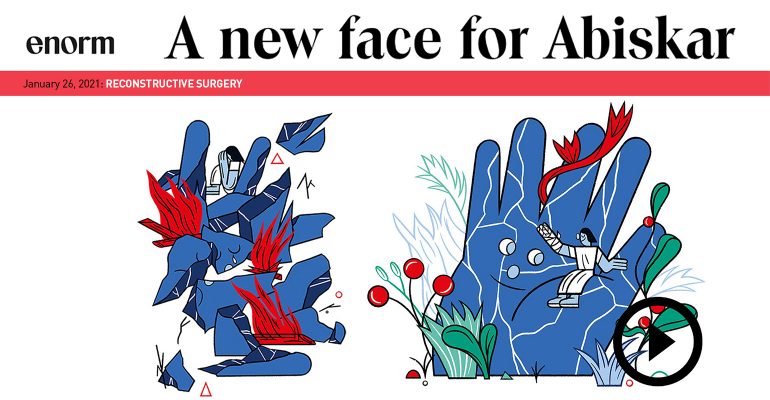Enorm magazine, January 26, 2021. Translated from German.
Eight-year-old Abiskar Adhikari was playing around an open fire when the accident happened: the flames burned his entire face. The skin melted so much that his nose was completely deformed – all the features melted away, and a network of scars remained.
Abiskar lives in Nepal. Burns are one of the leading causes of serious injury and death in Nepal, according to a study by Nepalese surgeons Sanjib Tripathee and Surendra Jung Basnet published by Oxford University Press in 2017. In eight different studies evaluated by the doctors, the mortality rate of treated burn victims was between 4.5 and 23.5 percent. Often the victims are not taken to hospital until weeks after their burns, many are never treated or die immediately from their injuries. A major problem in Nepal and all developing countries around the world is the great shortage of plastic surgeons, i.e. doctors who reconstruct damaged tissue and organs using means such as skin transplants.
Access to reconstructive surgery: acute treatment is not enough
Since the early 1980s, the American plastic surgeon Larry Nichter volunteered in organizations around the world to treat burn victims and other people with deformities for free. “However, I found that the method of treating acute deformations and then walking again is not effective. Follow-up treatment is absolutely necessary to deal with any complications. And just because you have treated a few people, that is not enough in the long term, because countless other people will follow. It’s even worse that it becomes so dependent on external help. ”So he decided to found Mission Plasticos, an NGO where medical professionals, nurses and other medical staff from around the world treat patients who are internationally free of charge through poverty,lack of infrastructure and treatment options do not have access to medical help. These can be burn victims, but also children who are born with cleft lips or palates and thus cannot eat, breathe or speak properly.
Plastic surgery training
At the same time, the NGO trains doctors in plastic surgery on site and exchanges knowledge and technical skills. This is to ensure in the long term that sustainable health care is created. In some countries such as Kenya, such comprehensive training programs for medical professionals have emerged. In order to combat the causes of injuries such as burns preventively, Mission Plasticos is currently organizing a global hackathon together with the University of Washington and other stakeholders to find alternative, safe and inexpensive heating technologies that could replace dangerous house fires in rural regions of Nepal.
Access to reconstructive surgery: being able to smile again
Little Abiskar in Nepal was operated on by surgeons from the NGO in the Kirtipur Hospital in Kathmandu. Today you can still see the burns, but his natural features have been restored: He is a handsome boy, despite the scars he can speak and smile freely. But not everyone is as lucky as Abiskar.
Once, a 17-year-old girl was admitted to Kirtipur Hospital three weeks after her severe burn. Plasticos doctors treated her, but it was too late: due to the many wounds, she was already suffering from blood poisoning, from the consequences of which she died. Children who survive their burns also face great difficulties. “Some of them don’t leave their homes and go to school,” says Larry Nichter. As a result, children and adults alike would be socially isolated and unable to find a partner, which in turn led to poverty and exclusion.
The NGO, which is financed entirely by private donations, has long-term cooperation with some countries, including Nepal, Guatemala and Cuba. In such long-term projects, Plasticos is also concerned with creating sustainable financing models for local initiatives and medical facilities: The equipment in local hospitals is often a problem. The sensitive technology suffers from the sometimes extreme temperature conditions in the Global South, and there is often a lack of specialists who could repair the machines. For this reason, the NGO has also brought medical technicians on a mission in Nepal to repair broken machines and train the staff on site.
Global missions canceled
With the outbreak of the corona crisis, however, the work of Mission Plasticos suddenly came to a standstill. Missions that had just started had to be canceled, all global missions for the rest of the year have been canceled for the time being. “We are based in California and we immediately provided a list of all the medical equipment we have that could be of use to treat Covid-19 patients. Even though we knew that it would set us back very much to give up all this equipment, ”says Doctor Nichter on the phone.
Despite the lockdown in the USA, he and his team are treating patients in a local aid program that will continue during the pandemic. “There are countless people in the USA, including many migrants, who work here in indispensable and systemically important professions, but have no health insurance or are too poor to receive treatment,” explains Nichter. Many are also afraid of being deported after a doctor’s visit because they do not have a residence permit.
One of them is the Mexican Guadalupe Zumido, who as a young woman in her early 20s could not afford to have the cysts in her breasts removed in the USA. She underwent cheaper surgery in Mexico, but it was poorly performed and caused chronic pain. Parts of her breasts had been removed. In 2019 she was operated on by Mission Plasticos and her breasts were reconstructed. “It’s a miracle,” says Zumido today. She no longer feels any pain.
See the original German article here: https://enorm-magazin.de/gesellschaft/humanitaere-hilfe/ein-neues-gesicht-fuer-abiskar


